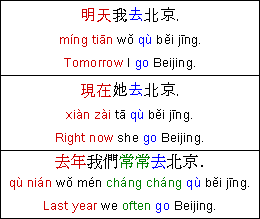




When you were reading about verbs just now, I heard you ask, "Then how can we express past and future tense in Chinese, whether something will happen tomorrow, is happening now, or happened yesterday?"
Excellent question! I knew you were a sharp one. And let's call this element of Chinese grammar the "verbal aspect" instead of "tense" here, just to be precise.
To answer your question in broad terms, let's pretend for a moment that English verbs have only one form each, with no inflections or aspects or tenses whatsoever.
For
example, say we have the verb 'go' but no such thing as went,
gone, am going, will go, and
etc. Nothing but 'go'.
How would we try to express tense and time in English under these circumstances? Probably like this, which is one way Chinese does it:
Adverbs! Instead of inflecting verbs, the Chinese language relies heavily on the use of adverbs to communicate what English and many other languages do with different verb tenses. And looking at the literal translations in the following examples, you realize that English could probably also get by without verb inflections in a pinch:

There are other ways of expressing tense - I mean, verbal aspect - in Chinese, such as with "aspectual particles." These can help us differentiate, for example, between "I went to Beijing (yesterday)" and "I have been to Beijing (before)." We'll look at these examples next.